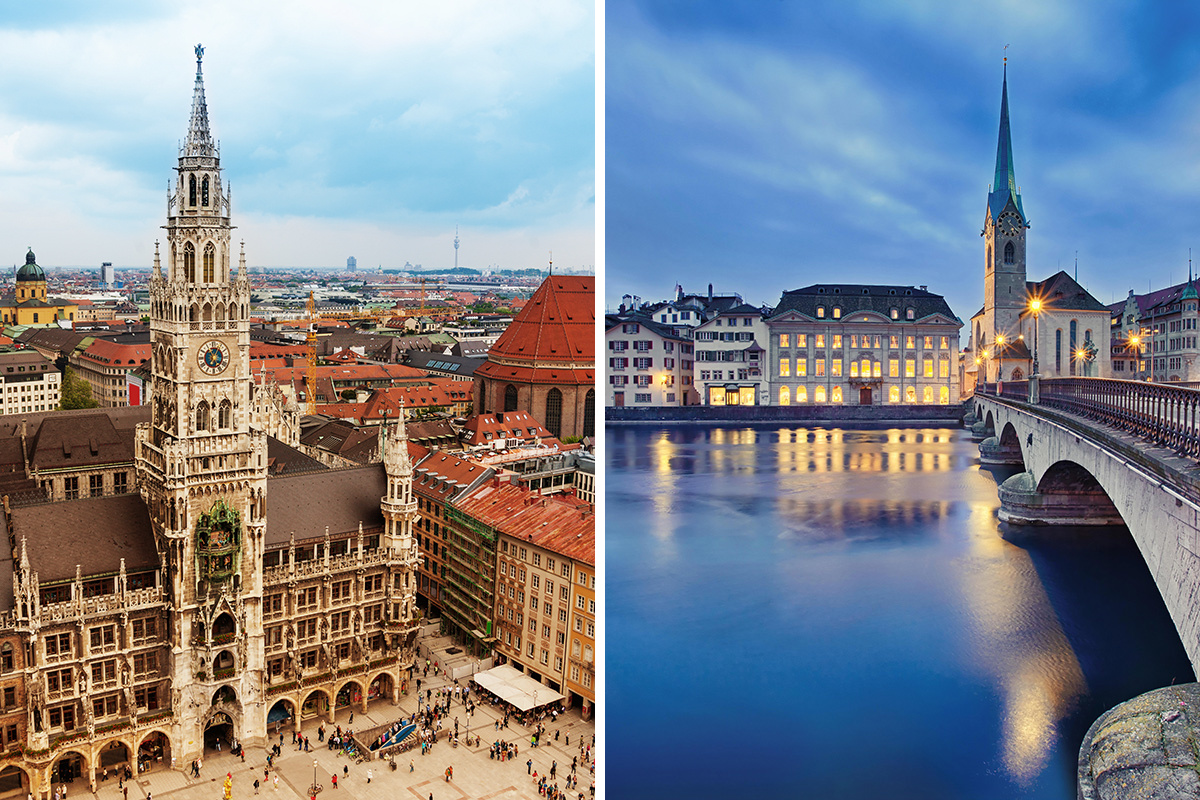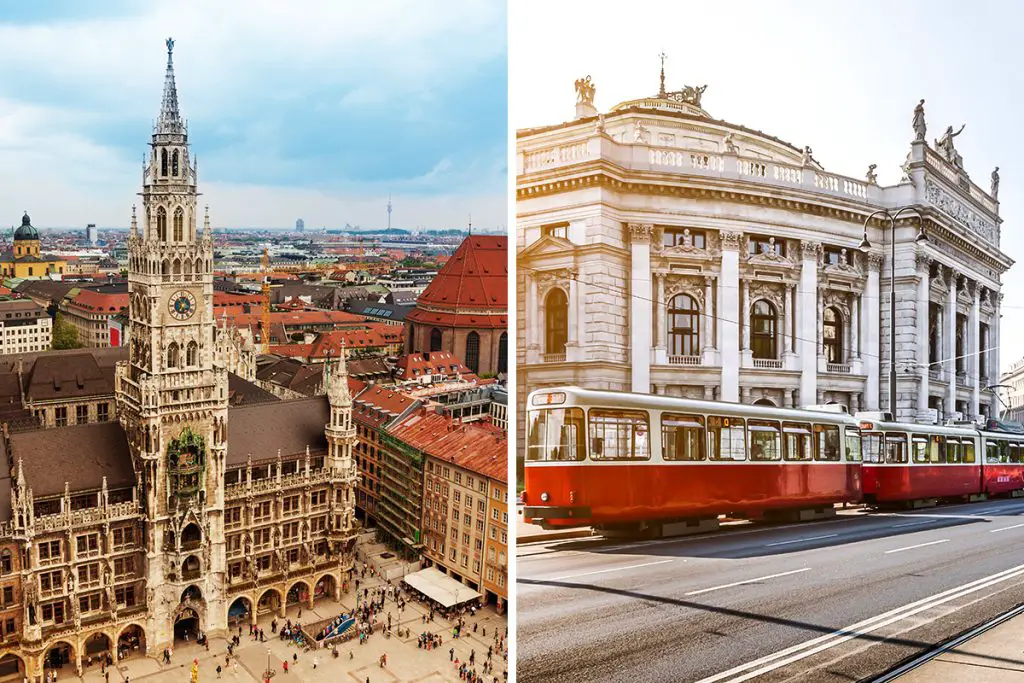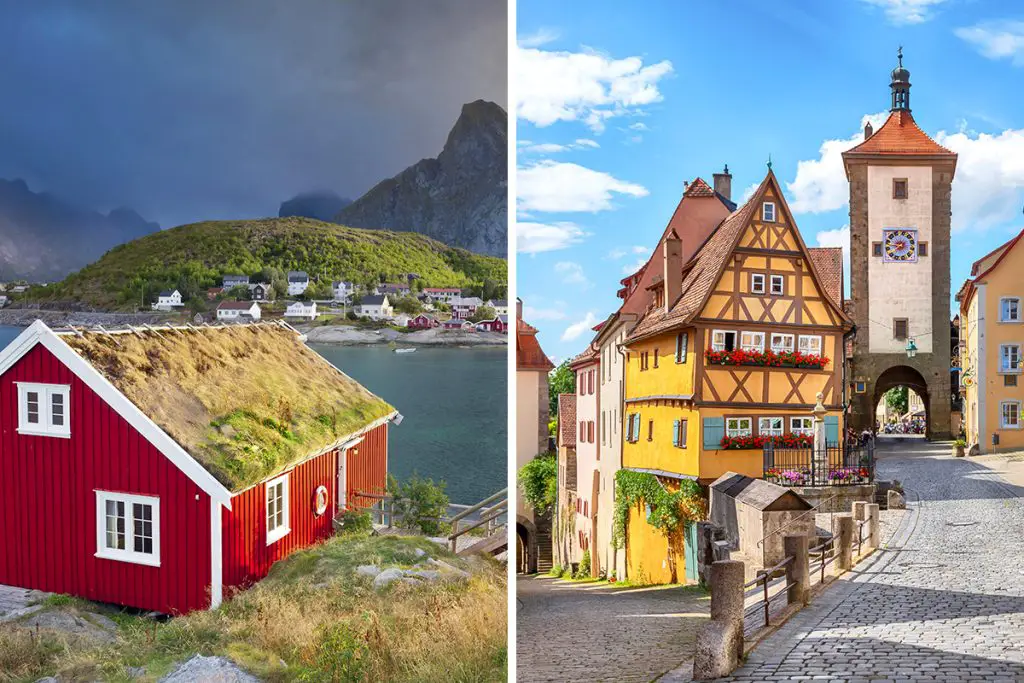If you’re a lover of travel and culture, both Munich and Zurich are sure to appeal to your sense of adventure. As you delve into the heartbeat of each city, you’ll find fascinating tales of history and a lifestyle that encapsulates their distinct identities. So, which city will capture your heart? Let’s find out!
History & Culture
As you embark on this exploration of Munich and Zurich, it’s important to understand the history and culture that have shaped these cities into the vibrant places they are today.
Munich, the capital of Bavaria, carries the weight of a deep and turbulent history. You’ll feel the echoes of its past as you walk through its streets, where centuries-old traditions are lovingly upheld.
The city’s flair for arts and architecture is palpable, seen in the grand Baroque and Rococo buildings. Munich is a city that takes pride in its heritage and yet embraces modernity with open arms.
In contrast, Zurich has a different rhythm. This Swiss city is known for its serene beauty and its place at the heart of the country’s economic and cultural life. It’s a city that wears its history lightly. You’ll see medieval influences in its beautiful old town, but it’s also a city that has made way for cutting-edge design and innovative expressions of Swiss culture.
In the realm of culture, Munich is a city that thrives on its traditional festivals, such as Oktoberfest, a celebration that has gained worldwide fame. Munich’s music and theatre scenes are well-established, its love for the arts is visible in the many galleries and museums scattered throughout the city.
Zurich, meanwhile, focuses on quality of life. The city is known for its high standard of living and its commitment to sustainability. Zurich’s cultural life is a blend of high-end sophistication and a deep connection with nature, seen in its well-kept parks and the beautiful Lake Zurich.
So, as you can see, both Munich and Zurich hold their own when it comes to history and culture. Munich is a city that embodies the spirit of Bavaria, its past a living part of its present. Zurich, on the other hand, offers a harmonious blend of old-world charm and modern sophistication. The question is, which city’s vibe matches yours?
Attractions & Activities
Let’s dive into what makes Munich and Zurich tick. The heart of a city is often seen through its attractions and activities, things that define the city’s character. Both Munich and Zurich have plenty to offer in this regard, each with its own distinctive flair.
In Munich, the grandeur of the Nymphenburg Palace is a sight to behold. The Palace, with its exquisite gardens, transports you back in time to the era of Bavarian monarchs.
Alternatively, immerse yourself in the world of science and technology at the Deutsches Museum. With about 28,000 exhibited objects from 50 fields of science and technology, it’s a place where you can easily spend an entire day.
For those who appreciate art, the Alte Pinakothek, one of the oldest art galleries in the world, is a must-visit in Munich. Housing an impressive collection of Old Master paintings, it’s a testament to Munich’s rich artistic heritage. Another enriching activity is a visit to the Munich Residenz, once the royal palace of the Bavarian monarchs of the House of Wittelsbach.
Over in Zurich, the majestic Grossmünster church is an architectural marvel that offers stunning panoramic views of the city from its tower. You might also enjoy a stroll around the historic Lindenhof Hill, a peaceful oasis in the city and a vantage point that offers sweeping views of the Old Town, University, and Limmat River.
The Kunsthaus Zurich is a hub for modern and contemporary art lovers, boasting a collection that spans from the Middle Ages to the present. And of course, a trip to Zurich would not be complete without a leisurely cruise on Lake Zurich, offering an idyllic escape from the hustle and bustle of city life.
Comparatively, Munich offers a rich tapestry of historic and cultural attractions, while Zurich combines its history with a close connection to nature. The choice boils down to what kind of experiences appeal to you more. Are you drawn to the regal history of Munich or the tranquil charm of Zurich?
Eating, Drinking & Nightlife
Unraveling the tastes and rhythms of Munich and Zurich can lead to some thrilling discoveries. The culinary scene, local drinks, and nightlife in these cities add unique flavors to your travel experience. Let’s embark on this flavorful journey.
In Munich, you’ll find hearty and traditional Bavarian cuisine. Feast on pretzels, sausages, and the iconic Schweinshaxe (pork knuckle), while not forgetting the sweet apple strudel for dessert.
The city is synonymous with beer, and the legendary Hofbräuhaus, a 400-year-old beer hall, is a must-visit. Experience the traditional Bavarian beer culture with a stein of beer, and if you’re there from late September to the first weekend in October, the world-renowned Oktoberfest is an absolute must.
Zurich’s culinary scene is a blend of Swiss traditions and international influences. Don’t miss the local specialty, Zürcher Geschnetzeltes, a creamy dish of sliced meat. The city’s love for chocolate is well-known, and you can indulge in some of the best Swiss chocolate at the iconic Confiserie Sprüngli.
Zurich also has a thriving coffee culture, with traditional coffee houses and modern cafés dotted around the city.
When it comes to nightlife, Munich offers a range of options from traditional beer gardens and Bavarian dance halls to sleek rooftop bars. If you’re a music lover, the city’s jazz clubs will make for a night to remember.
Zurich, on the other hand, is famous for its high-end clubs and lounges. Plus, the summer Street Parade, one of the largest techno parades in the world, is a major highlight for partygoers.
In summary, Munich’s eating, drinking, and nightlife scenes offer a hearty, vibrant experience steeped in tradition, while Zurich presents a refined, eclectic mix of local and global flavors. Which city’s tastes and rhythms resonate with you?
Shopping
Exploring the shopping scene can reveal a lot about a city. It’s not just about buying souvenirs but about experiencing the local culture, craftsmanship, and lifestyle. So, let’s take a peek into what shopping in Munich and Zurich looks like.
Munich is a paradise for lovers of traditional crafts and high-end German brands. The city’s central square, Marienplatz, offers a range of shopping options from designer boutiques to traditional German clothing stores. Viktualienmarkt, a daily food market in the city center, is a treasure trove of fresh produce, local delicacies, and unique Bavarian crafts.
Meanwhile, Munich’s Schwabing district is known for its bohemian vibe and features a variety of unique boutiques and art galleries. For luxury shopping, Maximilianstraße is the city’s go-to destination, hosting high-end international and German brands.
On the other hand, Zurich offers a more diverse shopping experience. The famous Bahnhofstrasse is one of the world’s most exclusive shopping avenues, housing a variety of luxury boutiques and top Swiss watch and jewelry stores. The trendy district of Zurich-West, previously an industrial area, is now a vibrant neighborhood full of trendy boutiques and design shops.
For local goods, the Viadukt market in Zurich-West hosts several stalls selling everything from fresh organic produce to Swiss cheese and artisanal bread. Niederdorf, the old part of Zurich, is full of narrow, winding lanes offering a wide range of bookstores, clothing boutiques, and specialty shops.
In conclusion, both Munich and Zurich offer diverse shopping experiences. Munich leans towards traditional and high-end German brands, while Zurich presents a mix of luxury shopping and local Swiss products. Which city’s shopping scene catches your fancy?
Accommodation
When it comes to rest and relaxation, both Munich and Zurich offer diverse accommodations for different styles and budgets. From grand historic hotels to modern serviced apartments, let’s explore where you could unwind after a day of sightseeing.
In Munich, you’ll find a vast range of accommodations. There are luxurious hotels such as the Bayerischer Hof in the city center, offering grandeur and history. For a modern twist, Andaz Munich Schwabinger Tor offers sleek design and panoramic city views.
If you’re traveling on a budget, the city has numerous hostels like Euro Youth Hotel, which offer a cozy place to rest without breaking the bank.
Zurich also boasts an impressive selection of accommodations. The Dolder Grand offers luxury with stunning views over Lake Zurich and the Alps.
If you’re looking for something boutique, the Marktgasse Hotel in the heart of the old town combines modern comfort with historical charm. Zurich also offers affordable options such as Hotel Fly Away, offering great value for money.
To sum up, whether you’re seeking luxury, boutique charm, or budget-friendly comfort, both Munich and Zurich have an array of accommodations to fit your needs. What’s your preference: the traditional hospitality of Munich or the diverse offerings of Zurich?
Family-Friendliness & Children’s Activities
Traveling with family requires considering a different set of features in a city. Let’s look at how Munich and Zurich cater to the little ones and offer experiences the whole family can enjoy.
Munich shines when it comes to family-friendly activities. The Deutsches Museum has a dedicated children’s section, where kids can learn about science through interactive displays. The city’s zoo, Tierpark Hellabrunn, is another favorite, offering close encounters with a range of animals. Munich also has plenty of parks where families can enjoy picnics and outdoor games.
In contrast, Zurich offers a mix of urban and nature experiences for families. The Zurich Zoo is home to more than 360 different animal species, and the Masoala Rainforest Hall offers a unique jungle experience. For those who love the outdoors, Uetliberg Mountain provides numerous walking and hiking trails suitable for all ages.
Both Munich and Zurich offer a wide range of children’s activities and family-friendly environments. Will you choose the interactive education in Munich or the blend of city and nature in Zurich for your family adventure?
Getting There & Getting Around
Deciding on a travel destination also means considering the journey and how to navigate once you’ve arrived. Let’s look at how Munich and Zurich fare in this regard.
Getting to Munich is straightforward. The city’s airport, Munich Airport (Flughafen München), is one of the busiest in Europe, with numerous international and domestic flights. It’s approximately 23 miles (37 kilometers) northeast of the city center. Trains are another popular option, with Munich’s central train station (Hauptbahnhof) connecting to many European cities.
In Zurich, the city’s airport, Zurich Airport (Flughafen Zürich), is the largest in Switzerland and provides flights to destinations around the world. It’s conveniently located about 8 miles (13 kilometers) north of the city center. Zurich is also well-connected by train to other Swiss cities and neighboring countries.
Once in the cities, both Munich and Zurich boast excellent public transportation systems. Munich has an extensive network of U-Bahn (underground), S-Bahn (suburban trains), trams, and buses. Zurich, on the other hand, is served by a system of trams, buses, and boats on the lake. Both cities also offer bike rentals for an active way to explore.
In conclusion, both Munich and Zurich are well-connected by air and train, with efficient public transportation systems for getting around the cities. Which city’s journey and navigation options fit your travel plans?
Weather
Weather plays a huge role in shaping your travel experience. Let’s delve into the climates of Munich and Zurich, so you can plan your visit accordingly.
Munich experiences a temperate seasonal climate. Summers, from June to August, are warm with average highs around 75°F (24°C), perfect for outdoor activities. Winters, however, can be chilly, with temperatures in January dipping to 30°F (-1°C) on average. Munich also experiences a beautiful fall season, with the leaves changing colors in October.
Zurich, like Munich, also has a temperate climate. Summers, from June to August, are moderately warm with average highs around 76°F (24°C), and winters can be cold, with temperatures in January averaging around 34°F (1°C). Spring and fall in Zurich are pleasant, offering mild temperatures and blooming flowers or autumn leaves.
In conclusion, both Munich and Zurich experience warm summers, cold winters, and beautiful spring and fall seasons. Will you choose the vibrant fall of Munich or the pleasant spring of Zurich?
Safety
Safety is a key consideration when choosing your travel destination. Let’s examine how safe you might feel in Munich and Zurich.
Munich, in general, is considered a safe city for travelers. The crime rate is low, and the city has a highly professional police force. However, like any major city, it’s always important to take precautions, especially in crowded areas.
Zurich also ranks high in safety for visitors. The city is known for its cleanliness, order, and well-maintained public spaces, contributing to the overall sense of security. The Swiss Police are reliable and efficient.
When it comes to non-crime safety, both cities are well-prepared. They have excellent healthcare facilities, and their public transportation systems are known for their reliability and safety.
To sum up, both Munich and Zurich are generally safe cities with efficient police forces and excellent public services. Where will you feel more at ease, the orderly streets of Zurich or the safe spaces of Munich?
Cost
The cost of your vacation can significantly impact your travel decisions. So let’s look at how Munich and Zurich stack up when it comes to the cost of food, lodging, and transportation.
In general, Munich is slightly less expensive than Zurich. A meal at a mid-range restaurant costs around 20 Euros ($24), and a one-way ticket on public transport is about 3 Euros ($3.50). Accommodation prices vary, but you can find a decent hotel room for around 100 Euros ($117) per night.
Zurich, on the other hand, is known as one of the most expensive cities in the world. A meal at a mid-range restaurant will cost you around 40 Swiss Francs ($43), while a one-way public transport ticket is about 3.10 Swiss Francs ($3.30). Hotel rooms are more expensive, with prices starting from 150 Swiss Francs ($160) per night for a decent room.
To wrap it up, while both Munich and Zurich offer incredible experiences, Zurich is generally more expensive. Are you more inclined towards the slightly cheaper options of Munich or do you prefer to splurge in Zurich?
Which Is Better – Munich or Zurich?
Choosing between Munich and Zurich can indeed be a tough call. Both cities have their unique charms, making them compelling destinations for travelers. Let’s summarize what we’ve learned about these cities to help you make your choice.
In terms of history and culture, both cities have a rich past. Munich’s Bavarian heritage, combined with the many cultural festivities like Oktoberfest, make it an exciting place for those who appreciate tradition and fun. On the other hand, Zurich’s remarkable Old Town and the centuries-old traditions preserved there may appeal more to history buffs.
When it comes to attractions and activities, Munich’s combination of art museums and sporting events may make it a better choice for those seeking a mix of high culture and high-energy fun. Zurich’s picturesque landscapes and stunning Lake Zurich, however, might be more enticing for nature lovers.
Munich might be a more appealing destination for beach enthusiasts, with the beautiful lake beaches near the city. Zurich, although it doesn’t boast sandy beaches, offers wonderful lake swimming experiences in the summer months.
In terms of food, drink, and nightlife, Munich with its iconic beer halls and vibrant nightlife is a heaven for party lovers. Zurich’s cosmopolitan restaurant scene and sophisticated bars, however, offer a refined dining and drinking experience.
Shopping in both cities can be exciting. Munich’s vibrant markets and globally recognized brands could appeal to those seeking variety. Zurich, with its world-renowned Swiss watches and luxury boutiques, is ideal for high-end shopping enthusiasts.
Accommodation in both cities offers a wide range of options. Zurich’s lodging might be a bit on the pricey side, but the exceptional Swiss quality justifies it. Munich’s accommodation options offer a balance of cost and comfort.
In terms of family-friendliness, Munich’s many child-friendly attractions make it a great choice for families. Zurich, with its safe and clean public spaces, also makes for a fantastic family destination.
Both cities have excellent transportation networks, but Munich’s public transportation might be slightly more economical than Zurich’s.
Weather in both cities is relatively similar with warm summers and cold winters. Zurich tends to be slightly warmer in winter.
Both cities are known for their safety, but Zurich’s reputation for orderliness may give it a slight edge.
In terms of cost, Zurich is generally more expensive than Munich. If budget is a consideration, you might find Munich a more cost-effective destination.
So, is Munich or Zurich better for your next vacation? It ultimately depends on what you’re looking for. Whether it’s the cultural richness and fun-loving spirit of Munich, or the picturesque landscapes and luxurious experiences in Zurich, both cities are sure to give you an unforgettable travel experience.







